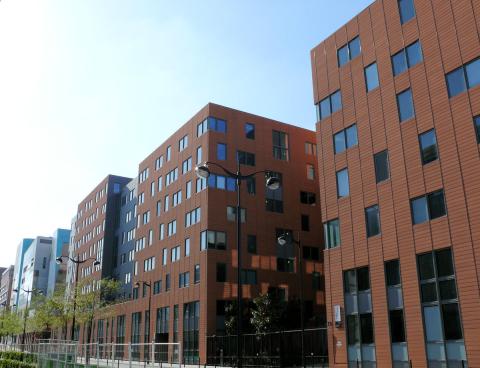Laboratoire AstroParticule et Cosmologie - CNRS/IN2P3 and Université Paris Cité
Institute

APC
CNRS/IN2P3 et Université Paris Cité
10, rue Alice Domon et Léonie Duquet
75013 Paris
France
+33 1 57 27 61 56

APC
CNRS/IN2P3 et Université Paris Cité
10, rue Alice Domon et Léonie Duquet
75013 Paris
France
+33 1 57 27 61 56
The AstroParticle and Cosmology laboratory (APC) is a joint research unit of University Paris Cité, CNRS, CEA, Observatoire de Paris and CNES. APC gathers about 75 permanent researchers, about 50 engineers, technicians and administrative staff, and about 75 Ph.D. students, post-doctoral fellows, and foreign visitors.
The laboratory research activities are centered around four main themes: cosmology (the study of the history and of the structure of the Universe with the Planck, Qubic, POLARBEAR experiments, the Rubin telescope, and the space mission Euclid) ; gravitation (gravitational wave astronomy with Virgo, Einstein Telescope and Lisa) ; high-energy astrophysics (the study of violent phenomena in the Universe to understand the physical processes that modulate the formation of cosmic structures, with the SVOM, ATHENA, INTEGRAL, HESS-CTA, JEM-EUSO, ANTARES-KM3NeT/ARCA experiments) ; elementary particle physics, in particular the study of the properties of the Higgs boson (ATLAS experiment and future circular collider project), of neutrinos (ORCA, DUNE), and the search dark matter particle candidates (Darkside). In addition to the experimental and observational activities described above, the themes covered by the laboratory are studied by the theory group.
All the teachers-researchers of the laboratory and some researchers participate in the teaching of the University of Paris. The laboratory also wishes to involve students in its various activities, through internships (about 100 per year) or theses.
Le laboratoire AstroParticule et Cosmologie (APC) est une unité mixte de recherche d’Université Paris Cité, du CNRS, du CEA, de l'Observatoire de Paris et du CNES. APC rassemble environ 75 chercheurs, 50 ingénieurs, techniciens et administratifs, et 75 doctorants, boursiers postdoctoraux, visiteurs étrangers.
Les activités de recherche du laboratoire sont centrées autour de quatre thématiques principales : la cosmologie (étude de l'histoire et la structure de l'Univers avec les expériences Planck, Qubic, POLARBEAR, le télescope Rubin et la mission spatiale Euclid) ; la gravitation ( astronomie des ondes gravitationnelles avec Virgo, Einstein Telescope et Lisa) ; l’astrophysique des hautes énergies (etude des phénomènes violents dans l'Univers pour comprendre les processus physiques qui modulent la formation des structures cosmiques, avec les expériences SVOM, ATHENA, INTEGRAL, HESS-CTA, JEM-EUSO, ANTARES-KM3NeT/ARCA) ; la physique de particules élémentaires, en particulier l’étude du boson de Higgs (expérience ATLAS et projet FCC), des neutrinos (ORCA, DUNE), et la recherche d’éventuelles particules de matière sombre (Darkside). Les thèmes couverts par le laboratoire sont étudiés par le groupe Théorie.
L’ensemble des enseignants-chercheurs du laboratoire et certains chercheurs participent aux enseignements de l’Université Paris Cité. Le laboratoire souhaite aussi faire participer les étudiants à ses diverses activités, à l'occasion de stages (une centaine par an) ou de thèses.
The laboratory, and the Paris Center for Cosmological Physics which is attached to it, organize or participate in several outreach initiatives on its premises (internships for students, teacher training, events for the general public) and elsewhere (conferences in high schools, Pint of Science , ..). Lab members are regularly invited for interviews in scientific radio shows or magazines.

